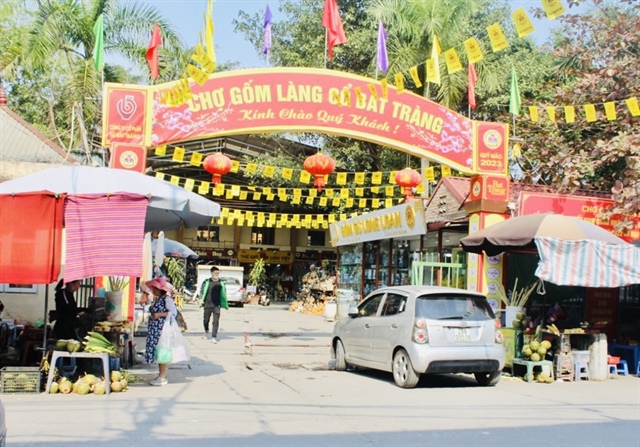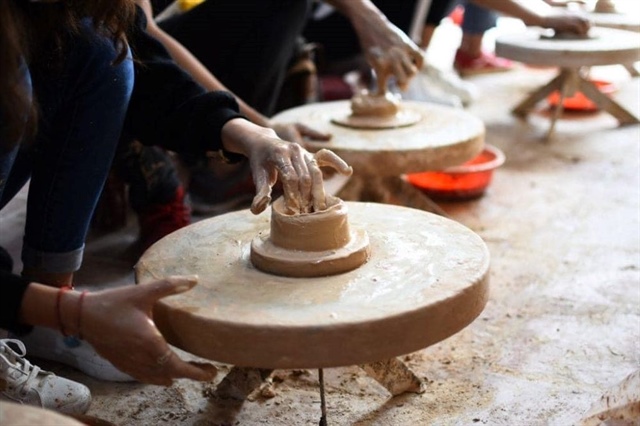Plan to boost tourism in Hanoi's Bat Trang Village awaits approval
Plan to boost tourism in Hanoi's Bat Trang Village awaits approval
The commune has held numerous discussions with government agencies and consultants to develop a plan to ensure maximum operations.
With a vision for socio-economic advancement and a modernized Hanoi, Gia Lam District has embarked on ambitious plans to develop the Red River urban area, fostering growth while preserving the craft heritage of Bat Trang Pottery Village.
Residents and local authorities in the village of Bat Trang are awaiting approval of a detailed plan to preserve their traditional crafts while boosting tourism.
A catalyst for sustainable development

Bat Trang Village market. Photo: Kinhtevadubao |
Nestled on the left bank of the Red River, Bat Trang Pottery Village is over 10 km southeast of the bustling center of Hanoi. This historic village has flourished on the outskirts of Thang Long for more than 700 years.
Known for its fine ceramics and unique culture, Bat Trang is a dynamic icon of the capital's rich traditional handicraft heritage and a tourist magnet.
Chu Minh Quang, an urban management specialist from Gia Lam District, explained that since 2016, Hanoi and Gia Lam have been working together to create a comprehensive plan that blends historic preservation with the rise of tourism to ensure that Bat Trang's development lives up to its potential.
Earlier, to encourage traditional crafts and cultural values while stimulating tourism and trade, the city government selected Bat Trang Pottery Village and Van Phuc Silk Weaving Village for a competitive planning initiative, inviting participation from both local and international consulting firms.
In November 2016, the Hanoi People's Committee issued Decision No. 6248/QD-UBND, approving the results of the planning competition. The winning proposal for Bat Trang was submitted by the joint venture of Nikken Sekkei Civil Ltd (Japan) and the Construction Technology Consulting and Transfer Office. The city government then commissioned the Department of Planning and Architecture to develop the planning project.
As directed by the city government, Gia Lam District worked closely with the Department of Planning and Architecture to achieve the project's ambitious goals. By the end of 2020 and into early 2021, the planning project was nearly complete, culminating in a conference to present and exhibit the plan while gathering community feedback as needed.
However, on March 25, 2022, the Hanoi People's Committee issued Decision No. 1045/QD-UBND, which gave the green light to the 1:5,000 scale Red River Urban Area Master Plan. This decision means that the detailed planning project to preserve Bat Trang Village must be temporarily shelved, allowing the Department of Planning and Architecture and consulting teams to realign it with the new urban framework.
Quang highlighted that the approval of this master plan could delay the ratification of the Bat Trang craft village project.
"This decision lays a crucial legal foundation and serves as an important springboard for Gia Lam District, the Department of Planning and Architecture, and other stakeholders to explore new planning opportunities. These opportunities aim not only to protect the craft village but also to serve as a catalyst for the sustainable development of traditional trades, which are closely linked to tourism," he elaborated.
Residents eagerly await plan approval

Visitors to the Bat Trang Ceramics Museum. Photo: Bat Trang Ceramic Museum |
Nguyen Van Ky of Giang Cao Village, Bat Trang Commune, said that several infrastructure projects such as electricity, roads, schools, and health stations have been initiated locally to promote the growth of the handicraft village and achieve the goal of building a new-style rural landscape.
Yet, since 2016, when Hanoi launched the initiative for preserving the craft village, all infrastructure developments meant to support the community have been put on hold, pending plan approval.
He pointed out that Bat Trang is a bustling craft village, with hundreds of vehicles bringing in some 500 tons of raw materials for production and shipping products to markets every day.
Despite the heavy traffic, the roads remain unmaintained, lacking essential upgrades and unable to meet the production demands of local residents, leading to further deterioration over time, Ky added.
In addition to the roads, the community's cultural center has yet to be approved for construction. As a result, residents have to rent a hall to hold meetings, votes, or cultural events.
"Meanwhile, the neighboring communities in Gia Lam District have seen a flurry of investment, with major roads and picturesque lanes being paved and modern cultural houses being built. This progress has intensified Bat Trang residents' longing for the rapid approval of the detailed plan for the craft village, which will allow for vital infrastructure investment in their community," Ky said.
Pham Huy Khoi, Chairman of Bat Trang Commune, highlighted the unique nature of Bat Trang, where a significant part of the land is in the Red River floodplain. Of the commune's total area of 178 hectares, nearly 148 hectares are in the riparian zone.
He added that in line with the approved master plan for the Red River area, Bat Trang is ready to develop a detailed strategy to preserve its handicraft heritage while boosting tourism.
Khoi stressed that the commune has held numerous discussions with various agencies and consulting firms to create a unified plan that will ensure maximum efficiency during implementation.
Despite these efforts, the chairman lamented that the plan is still awaiting approval.
The local government has urged the relevant authorities to expedite the approval process for the detailed planning of Bat Trang Village so that the area can be transformed and investments can be secured for various tourism-related projects outlined in the conservation plan. This could pave the way for Bat Trang to become one of the capital's premier tourist destinations in the near future.


























